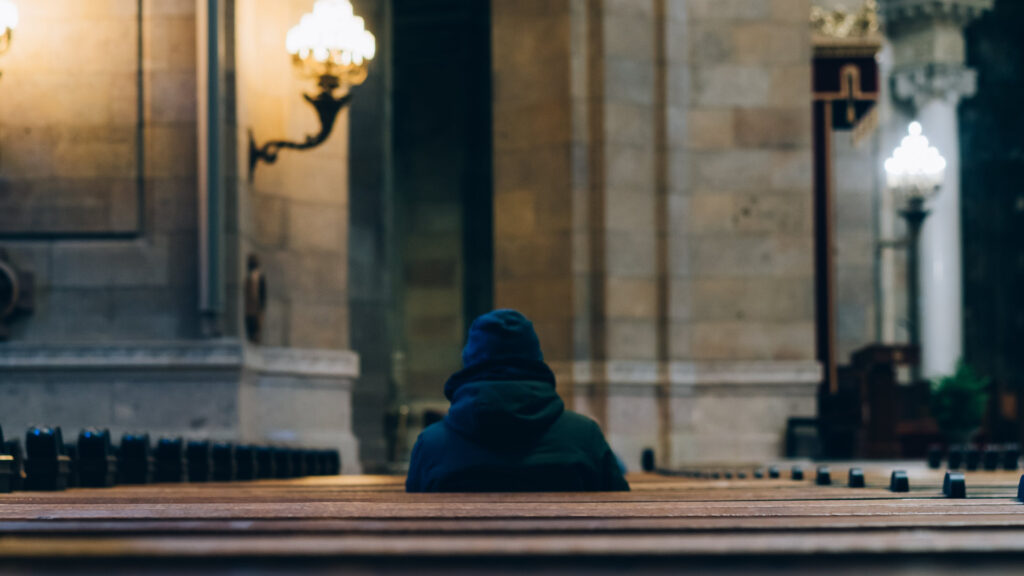Genesis
Night Dreams
Read This Week: Genesis 40
Some time later, the cupbearer and the baker of the king of Egypt offended their master, the king of Egypt. Pharaoh was angry with his two officials, the chief cupbearer and the chief baker, and put them in custody in the house of the captain of the guard, in the same prison where Joseph was confined. The captain of the guard assigned them to Joseph, and he attended them. After they had been in custody for some time, each of the two men—the cupbearer and the baker of the king of Egypt, who were being held in prison—had a dream the same night, and each dream had a meaning of its own. – Genesis 40:1-5 NIV
This chapter introduces us to the characters of the chief cupbearer and the chief baker, both serving under Pharaoh, the ruler of Egypt. Both men find themselves imprisoned in a peculiar turn of events, each plagued by unsettling dreams. These dreams, though seemingly ordinary, carry significant symbolism. The cupbearer dreams of pressing grapes into Pharaoh’s cup, while the baker dreams of birds eating bread from a basket on the ruler’s head. These dreams catalyze the events that unfold in this section, setting the stage for God’s continued intervention and redemption of people and their lives.
Enter Joseph, the young Hebrew man we’ve been journeying with for the last three chapters. He is also imprisoned and coincidentally possesses the gift of interpreting dreams. Upon hearing the dreams of the cupbearer and the baker, Joseph offers to interpret them, acknowledging that interpretations belong to the spirit of God. Through divine guidance, he deciphers the dreams, foretelling the imminent fate of the two men. The cupbearer’s dream signifies restoration to his former position, while the baker’s dream foreshadows a grim outcome – his execution by Pharaoh’s decree.
True to Joseph’s interpretation, the events transpire exactly as he predicted. The cupbearer is restored to his position, but unfortunately, the baker meets his demise, just as Joseph had prophesied. However, amidst the intricate web of dreams and interpretations, this particular section of Scripture highlights and calls attention to a broader theme – the ever-present concept of redemption. Joseph, despite enduring betrayal and hardship, remains steadfast in his faith and commitment to interpreting dreams, ultimately paving the way for his eventual salvation and rescue from oppression.
Genesis once again gives us spiritual insights into our lives. It teaches us the importance of faith, even in adversity, and the significance of using our God-given talents and gifts for the greater good and furtherance of His kingdom. Moreover, it highlights the notion of God’s timing in our lives and how He can use us on time in the lives of others as His sovereign plan unfolds in mysterious ways, often beyond our own comprehension.
But there is another lesson to glean from this chapter. We relate not only to Joseph but also to the butler and the baker. In this view, Jesus is like Joseph to us. He was an innocent man who came into our place and described our predicament or condition. He revealed God’s message to us, which was proven true in three days. Joseph, like Jesus, shares a message from God that can bring life or death. When we look for a message from God, we look to Jesus like those with night dreams in this passage. We look for the good news of the gospel, and that news and message rescued us.
Through the dreams of the cupbearer and the baker, we witness God’s activity shaping destinies in the lives of people like us. We then observe Joseph’s strong faith and his pivotal role in interpreting these dreams, ultimately leading to his restoration and eventual rise to power in Egypt. As we reflect on this, may we find inspiration in Joseph’s journey and the overarching message of hope, wisdom, and divine providence.
In The Darkness
Read This Week: Genesis 39
But while Joseph was there in the prison, the Lord was with him; he showed him kindness and granted him favor in the eyes of the prison warden. So the warden put Joseph in charge of all those held in the prison, and he was made responsible for all that was done there. The warden paid no attention to anything under Joseph’s care because the Lord was with Joseph and gave him success in whatever he did. – Genesis 39:20-23 NIV
Genesis 39 is a profound exploration of resilience, integrity, and divine providence. Within its verses lies the captivating story of Joseph, a young man sold into slavery who rises from the depths of despair to become a beacon of hope and righteousness. Through the lens of this chapter, we embark on a journey that delves into the complexities of human nature, the dynamics of power, and, once again, the benefits of enduring faith in the face of adversity.
At its core, this section recounts the trials and triumphs of Joseph, who finds himself in the household of Potiphar, an Egyptian official. Despite being torn from his family and thrust into a foreign land, Joseph demonstrates unwavering integrity and diligence in his service. His remarkable qualities do not go unnoticed, as Potiphar soon entrusts him with managing his entire household. However, Joseph’s ascent to prominence is abruptly interrupted by a test of character that will define the course of his destiny.
Enter Potiphar’s wife, a figure whose advances Joseph steadfastly rejects out of loyalty to his master and fear of sinning against God. Faced with her relentless pursuit, Joseph stands firm in his principles, refusing to succumb to temptation. Yet, his refusal incites the wrath of Potiphar’s wife, leading to false accusations of assault and resulting in Joseph’s imprisonment.
Joseph’s faith is tested once more in the darkness of his confinement. Yet, even in the depths of despair, he finds solace in the knowledge that God remains ever-present, guiding him through the trials that beset him. Through divine intervention, Joseph gains favor with the prison warden, who entrusts him with overseeing the other prisoners. He shows amazing resilience despite injustice and adversity, and his unwavering commitment to righteousness and faithfulness to God ultimately paved the way for his redemption and eventual ascension to a position of authority in Egypt. In this, we witness the intricate interplay between human agency and the Lord’s providence, as Joseph’s steadfastness in adversity aligns with God’s overarching plan for his life. He grew in spiritual stature and maturity in the darkness.
Like many others in Scripture, this chapter shines a light on the nature of power and moral responsibility. While tempted, Joseph’s refusal to compromise his principles underscores the importance of ethical conduct and the dignity of every individual. His exemplary behavior starkly contrasts the moral failings of those around him, highlighting the transformative power of integrity and virtue in the midst of a corrupt and fallen world. This shows us that in our own age, which is marked by moral ambiguity and ethical compromise, we, too, can be examples of hope and inspiration. We can emulate Joseph’s unwavering faith, resilience, and commitment to righteousness, knowing that even in the darkest of times, God’s hand remains ever-present. We, too, can be a light in the darkness.
Divine Extraction
Read This Week: Genesis 38
At that time, Judah left his brothers and went down to stay with a man of Adullam named Hirah. There, Judah met the daughter of a Canaanite man named Shua. He married her and made love to her; she became pregnant and gave birth to a son, who was named Er. She conceived again and gave birth to a son named Onan. She gave birth to still another son and named him Shelah. – Genesis 38:1-5 NIV
Genesis 38 is a chapter often overlooked or cautiously approached due to its sensitive content and apparent break from the main narrative. However, beneath its surface lies a story that is very familiar to life and encapsulates themes of deception, redemption, and the mysterious workings of God’s providence. With the backdrop of the patriarchal era, this chapter unfolds amidst the lineage of Judah, one of the sons of Jacob. It begins with Judah’s departure from his brothers, venturing into the world of Canaanite culture, commerce, and religious practice. Here, he forms relationships that will profoundly impact his life and the future of his lineage.
The story itself revolves around the characters of Judah, Tamar, and the twins Perez and Zerah. It opens with Judah marrying a Canaanite woman named Shua and fathering three sons: Er, Onan, and Shelah. Yet, things take a tragic turn with the deaths of Er and Onan, leaving Tamar, Er’s widow, in a state of limbo as she awaits the fulfillment of levirate marriage customs. Then, in a series of events marked by deception and betrayal, Tamar resorts to a disguise to trick Judah into fulfilling his duty as a kinsman-redeemer, or a relative who, according to various laws of the Pentateuch, had the responsibility to act on behalf of another relative who was in trouble, danger, or need. Disguised as a prostitute, she seduces Judah, who unwittingly impregnates her. This act of desperation underscores Tamar’s resilience and determination to secure her future and ensure her place within the lineage of Judah.
Despite the moral ambiguity of the actions portrayed here, the overarching theme of God’s sovereignty and providence emerges as a guiding force, just as it has at each step in the book of Genesis. Despite the characters’ flaws and shortcomings, God’s plan unfolds with design and inevitability, using even their missteps to accomplish His purposes. Through this incident of Tamar’s cunning and Judah’s unwitting participation, Judah’s lineage is preserved. Ultimately, this leads to the birth of Perez, an ancestor of King David, and, according to the Scriptures, the birth of Jesus.
Once again, redemption and restoration emerge as prevailing ideas and outcomes. Through Tamar’s bold actions, Judah is confronted with his own moral failings, leading to his repentance and acknowledgment of Tamar’s righteousness. In the birth of Perez and Zerah, we witness the restoration of Tamar’s honor and the continuation of Judah’s lineage. God is a good Father in this way for us as well. He redeems our faults, deficiencies, and poor choices when we repent and turn to Him. He extracts His glory and restores us; human elements and weaknesses do not derail His sovereign plan. God enacts a beautiful, divine extraction of his purposes from the ugliness of sin and broken people.
This section may seem like a detour from the narrative of Genesis, but it’s not. Its significance lies in its exploration of the human condition, God’s provision, and the triumph of His redemption. Through the unique interplay of characters and events, we are reminded that despite deception and betrayal, God’s purposes remain steadfast, weaving together the threads of human history to fulfill His greater plan of salvation.
Faith Amid Adversity
Read This Week: Genesis 36-37
Now Israel loved Joseph more than any of his other sons because he had been born to him in his old age, and he made an ornate robe for him. When his brothers saw that their father loved him more than any of them, they hated him and could not speak a kind word to him. – Genesis 37:3-4 NIV
Genesis 36 presents a fascinating exploration into the lineage of Esau, the elder twin brother of Jacob, whose story intertwines with the narrative of the patriarchs in the Bible. Often overshadowed by the prominence of Jacob, Esau’s descendants, as detailed in this chapter, offer valuable insights into the complexities of family dynamics, heritage, and divine providence. This chapter meticulously outlines the genealogy of Esau’s descendants, detailing his marriages, children, and the formation of tribal communities that would shape the landscape of the ancient Near East.
Genesis 37 shows us, through the lens of Joseph’s famous story, that we are still susceptible to the human condition of sin and how despicable choices of people can intersect with the overarching sovereignty and plans of Almighty God. Central to this chapter is the iconic “coat of many colors” given to Joseph by his doting father, Jacob. This garment becomes a symbol of favoritism and Joseph’s unique role within the family. Its significance lies not in material value but in the relational dynamics it signifies. The jealousy it incites among Joseph’s brothers catalyzes the ensuing events that are both chilling and providential.
Joseph’s brothers’ jealousy over his father’s favoritism reaches a boiling point as they plot to rid themselves of him. Their actions speak to the depths of envy, hatred, and the destructive nature of unchecked resentment. Yet, amidst their betrayal, we witness the dichotomies of family relationships and the tensions arising from competing desires for love, recognition, and validation. But God’s hand of providence is unmistakably present amid Joseph’s trials. Despite being sold into slavery and facing countless hardships, his journey ultimately leads him to a position of power and influence in Egypt. His rise from despair to prominence underscores the theme of divine orchestration amid human frailty.
This section offers timeless lessons for us today. It prompts us to examine our relationships, motivations, and responses to adversity. Moreover, it reminds us of the transformative power of forgiveness and redemption, as evidenced by Joseph’s eventual reconciliation with his brothers. It serves as a foundational chapter in the biblical narrative, laying the groundwork for the trials and triumphs of the Israelite people. Through the lens of this story, we can reflect on our tendencies in the flesh and our sinful human nature, the interplay between free will and divine intervention, and the enduring power of faith amid hardship. Exercising faith despite our circumstances is relevant to every generation of believers.
As we journey through our challenges in life, may we draw inspiration from Joseph’s unwavering trust in God’s plan and care for him, knowing that even in the darkest times, we are never truly alone. We can place our faith in the Lord Jesus amid any adversity the world offers.
Return to Bethel
Read This Week: Genesis 35
So Jacob said to his household and all who were with him, “Get rid of the foreign gods you have with you, and purify yourselves and change your clothes. Then come, let us go up to Bethel, where I will build an altar to God, who answered me in the day of my distress and who has been with me wherever I have gone.” – Genesis 35:2-3 NIV
In Genesis 35, we witness another crucial moment in a long line of pivotal moments in the life of Jacob, the patriarch of the Israelites. This passage unveils a journey of spiritual renewal, reconciliation, and divine promises. At its heart lies the significance of Bethel, where Jacob encounters God and reaffirms his commitment to His covenant. This narrative, like so many others, can inform our lives, help us glean insights into our walk with God, and give us wisdom for our spiritual journeys. It can help us understand the significance of our own symbolic return to Bethel.
Before diving in, it’s essential to grasp the preceding events. We’ve seen how both triumphs and trials have marked Jacob’s life. He’s encountered divine promises, wrestled with angels, and endured familial strife. Amidst this tumultuous path, his relationship with God has evolved, culminating in his encounter at Bethel. This section begins with God instructing Jacob to return to Bethel, where God initially appeared to him (Genesis 28:10-22). This command represents a call to spiritual renewal and reconciliation. It prompts Jacob to confront his past, both the blessings and the mistakes, and recommit to the covenant with God.
Upon receiving God’s directive, Jacob instructs his household to rid themselves of foreign gods and purify themselves. This act signifies a turning away from idolatry and a return to true worship of Yahweh. It’s a potent symbol of spiritual cleansing and reconciliation with the Lord and an ancient reminder to us that we should always be mindful of the things that hinder us from following Jesus.
As Jacob and his household journey to Bethel, God’s presence surrounds them, offering protection and assurance. There, Jacob builds an altar out of his devotion, and in response, God reaffirms his name change to Israel. This affirmation reiterates the promise not only to him but to his countless descendants. This moment resonates with profound spiritual truths that are applicable to our lives today. Just as Jacob was called to return to Bethel, we too are invited to revisit the places of our spiritual beginnings, to rekindle our relationship with God. Bethel represents a space of encounter, where we lay aside distractions and idols, purifying ourselves for divine communion.
Like Jacob, we’re called to undergo a process of purification and reconciliation, putting aside anything that hinders our relationship with God. It’s a journey of introspection, repentance, and surrender—a process toward renewed faith and intimacy with Christ. Bethel is a reminder of God’s faithfulness and the fulfillment of His promises. Just as God reaffirmed Jacob’s identity and inheritance, He assures us of our identity as His children and our inheritance in His kingdom through the cross. In moments of doubt or despair, we can look to Bethel as a testament to God’s enduring covenant, the new covenant of Jesus.
Genesis 35 invites us into the sacred narrative of Jacob’s return to Bethel, urging us to embrace our own spiritual renewal and reconciliation with ourselves and others. As we revisit the places of our spiritual beginnings, may we encounter the Lord in a fresh way, purifying ourselves and laying claim to His promises and the passion we once felt at the start of our life with God. A return to Bethel is always a worthwhile trip.
Justice or Revenge?
Read This Week: Genesis 34
Then Shechem said to Dinah’s father and brothers, “Let me find favor in your eyes, and I will give you whatever you ask. Make the price for the bride and the gift I am to bring as great as you like, and I’ll pay whatever you ask me. Only give me the young woman as my wife.” Because their sister Dinah had been defiled, Jacob’s sons replied deceitfully as they spoke to Shechem and his father Hamor. They said to them, “We can’t do such a thing; we can’t give our sister to a man who is not circumcised.” – Genesis 34:11-14 NIV
In our study of the Book of Genesis, we have seen in abundance that it is a rich, profound source of narratives that explore the sovereignty of God, His covenant with man in conjunction with the complexities of human relationships, morality, and the consequences of our choices. In Genesis 34:11-31, we encounter a tragic tale involving Dinah, the daughter of Jacob, and Shechem, a Hivite prince. This story unravels a series of events highlighting the importance of justice, morality, and the unavoidable repercussions of our actions.
This section begins with Dinah, Jacob’s only daughter, visiting other daughters in the land. However, in an unfortunate turn of events, Shechem, the son of Hamor, sees Dinah, takes her by force, and lies with her. As the narrative unfolds, the focus shifts to the aftermath of this incident and the reactions of everyone involved, especially the families of the people involved.
Dinah’s brothers, Simeon and Levi, react strongly upon learning about their sister’s violation. They are filled with a sense of righteous anger and decide to take matters into their own hands. They scheme to deceive Shechem and Hamor, proposing a covenant of intermarriage between the two families. However, their true intentions are revealed when, while the men of the city are recovering from circumcision, Simeon and Levi attack and kill all the males, plunder the city, and rescue Dinah.
While the brothers may have felt justified in seeking retribution for their sister, the consequences of their actions are severe. Jacob, their father, expresses concern about the potential repercussions from neighboring tribes. The incident tarnishes the family’s reputation and raises questions about justice, vengeance, and the appropriate response to wrongdoing.
The chapter underscores the importance of seeking justice when wrongdoing occurs. However, it also raises questions about the methods employed by Simeon and Levi, prompting reflection on the balance between justice and revenge. Something we can all take a lesson from and apply to various situations when we are treated badly by someone else. While motivated by a desire for justice, Simeon and Levi’s impulsive and violent response results in far-reaching consequences. This story serves as a cautionary tale about the need to seek God first and thoughtfully consider the potential outcomes of our actions before we do something that could alter our lives and those around us. It is a worthwhile consideration in our current culture and times and for our witness in the world.
The account of Dinah and Shechem delves into the ever-important subject of moral decision-making. It challenges us to contemplate the seeming gray areas in ethical dilemmas and consider the consequences of compromising our moral principles for revenge or taking justice into our hands in a way that doesn’t always align with the heart of God. While the brothers acted to protect their sister, the lack of consultation with God and Jacob, as well as the extreme nature of their response, led to division and strained family relations.
Justice is different than revenge. The primary purpose of justice is to maintain fairness and order and uphold what is right. Revenge is often driven by personal emotions, anger, or a desire to retaliate against someone who has caused harm or offense. The most significant difference is in motive, and we can ensure that our motivation is correct when we allow the Holy Spirit to rule in our hearts and guide our decisions. We must seek justice tempered with wisdom, considering the broader implications of our choices, and navigating the intricate nature of relationships with care and understanding.
Reconciliation
Read This Week: Genesis 33
Jacob looked up, and there was Esau, coming with his four hundred men, so he divided the children among Leah, Rachel, and the two female servants. He put the female servants and their children in front, Leah and her children next, and Rachel and Joseph in the rear. He went on ahead and bowed down to the ground seven times as he approached his brother. But Esau ran to meet Jacob and embraced him; he threw his arms around his neck and kissed him. And they wept. – Genesis 33:1-4 NIV
It has been said that a sign of being an authentic Christian is not how well we avoid issues and conflict but how we respond to it. Being quick to take offense and slow to forgive and seek reconciliation is a mark of the world; anyone can do that. But being slow to take offense and quick to forgive and seek reconciliation is another thing altogether. Forgiving a person who has mistreated us and seeking to reconcile with them is not easy. The difficulty makes it powerful and reflective of the person of Jesus Christ. Genesis 33 exemplifies this, where we read a captivating story of reconciliation and brotherhood between Jacob and Esau. This chapter unfolds with tension, uncertainty, and, eventually, the power of forgiveness.
This chapter picks up after the dramatic events of Genesis 32, where Jacob wrestles with God and comes upon his estranged brother, Esau. The encounter is laden with fear and anticipation as Jacob prepares to face the consequences of his past actions. Having deceived Esau years ago, Jacob is now confronted with the possibility of retribution.
But as the brothers draw near, the unexpected happens. Instead of seeking revenge, Esau runs towards Jacob and embraces him. Reconciliation is profound, symbolizing forgiveness and letting go of past grievances. It challenges our understanding of human nature and the power of transformative encounters. It also invites us to reflect on the theme of forgiveness. Esau’s ability to forgive Jacob helps us see the beauty of compassion, letting go, and choosing reconciliation over retaliation. It prompts us to consider our relationships and the capacity that God gives us for forgiveness through the power of His Holy Spirit.
This time between Jacob and Esau is more than just a reunion; it is a life-changing experience. It signifies growth, maturity, and the potential for change in individuals. It encourages us to embrace the possibility of transformation in our own lives and relationships, even in the face of past mistakes. Through their vital, gracious moment, the once-estranged brothers rekindle their bond and remind us of the importance of family relationships and the healing that forgiveness can bring.
Genesis 33 is a picture of God’s reconciliation with us. We had a broken relationship with God. We were dead in our sin, disobedience, and rebellion. God did not have to forgive us. In His holiness, He could have easily withheld the way for us to experience forgiveness and propitiation for our sins. Instead, like Esau, God came to us through his Son, Jesus Christ. Through His great love, He embraced us, called us brother and sister, and forgave us. More than that, He desires a connection with us on the other side of reconciliation. We should do that for others and want the same with them.
Wrestling with God
Read This Week: Genesis 32
So Jacob was left alone, and a man wrestled with him till daybreak. When the man saw that he could not overpower him, he touched the socket of Jacob’s hip so that his hip was wrenched as he wrestled with the man. Then the man said, “Let me go, for it is daybreak.” But Jacob replied, “I will not let you go unless you bless me.” – Genesis 32:24-26 NIV
Christians often use the phrase “wrestling with God” to describe a time when they struggle with the Lord and His purposes. This wrestling usually comes amid complex or difficult circumstances. Yet the struggle can also result in tremendous growth and blessings from God after a season of prolonged and even painful striving with him. Genesis 32 is packed full of action, intrigue, and a mysterious and profound wrestling encounter between Jacob and God. This passage is rich with symbolism and spiritual lessons that have captivated readers for centuries. This fascinating story holds amazing truth and implications for our spiritual journeys.
Before delving into the wrestling match, it’s essential to understand the context leading up to this event. On his journey back to Canaan, Jacob is about to face his estranged brother Esau, whom he had deceived years earlier. Fearful of the potential confrontation, Jacob sends his family and possessions ahead, and he remains alone by the Jabbok River. As Jacob is alone, a man appears and wrestles with him until daybreak. The struggle is intense, and Jacob refuses to let go, demanding a blessing from his mysterious opponent. In response, the man touches Jacob’s hip, dislocating it, and changes his name to Israel, meaning “he who strives with God” or “God strives.” Verse 28 says, Your name will no longer be Jacob, but Israel, because you have struggled with God and with humans and have overcome.
The physical wrestling symbolizes Jacob’s internal struggle, representing the challenges we all face in our lives. We often grapple with doubts, fears, and the consequences of our past actions, just as Jacob did. But the change of Jacob’s name to Israel in this section signifies a transformative moment. The wrestling led to a new identity. It is a shift from his old self as a deceiver to one who struggles with God and comes out better for it. This transformation mirrors our potential for personal growth and spiritual renewal. These seasons and battles can produce the people He wants us to be. Our striving in His Spirit’s power leads us to that place of revival.
The touching of Jacob’s hip is also a significant act, demonstrating that true transformation often comes with pain. It signifies a humbling experience and the breaking of self-reliance, forcing Jacob to depend entirely on God. Jacob’s insistence on receiving a blessing shows his desperate hunger for the presence of the Lord and reminds us of our need to seek God, acknowledging our dependence on Him for strength and guidance.
As we reflect on Genesis 32, we can draw parallels to our own journeys of faith. Like Jacob, we may find ourselves wrestling with doubts, fears, and the consequences of our past. The story encourages us to persevere in our spiritual struggles, seeking transformation and blessing from God, even when it requires vulnerability and humility.
By wrestling with God, we discover the transformative power of surrender and the blessings that come from acknowledging our dependence on Him. All of our struggling with God in faith leads to peace. May this story inspire us to press on in our faith, trusting that God can bring about profound change in our lives as we strive with Him. It is a beautiful wrestling, and it is worth every strain.
Running Man
Read This Week: Genesis 31
On the third day, Laban was told that Jacob had fled. Taking his relatives with him, he pursued Jacob for seven days and caught up with him in the hill country of Gilead. Then God came to Laban the Aramean in a dream at night and said to him, “Be careful not to say anything to Jacob, either good or bad.” – Genesis 31:22-24 NIV
Genesis 31:22-55 unfolds a captivating episode in the life of Jacob. This passage narrates his departure from Laban’s household, marking a pivotal moment in his journey of faith and self-discovery. As we delve into the verses, we uncover layers of familial dynamics, God’s sovereignty, and the many layers of human relationships that don’t always make sense or fit into our box. Jacob’s flight from the domain of his father-in-law illustrates the instinct many people have in seemingly unnavigable situations. He was the running man.
The chapter begins with Laban discovering Jacob’s escape, setting the stage for this dramatic tale of a man on the run and his confrontation with his pursuers and himself. Unaware of Laban’s pursuit, Jacob is forced to deal with his clandestine departure, revealing the tension and mistrust between the two men. Laban’s accusations of why he ran and Jacob’s defense of his running illuminate an intricate web of deceit and manipulation that has characterized their relationship and that we have already observed in our study.
Amid the brewing conflict, the story turns unexpectedly as Laban and Jacob enter a covenant. This covenant, marked by a heap of stones, is a tangible witness to their agreement. It also highlights the divine presence of God in the middle of misguided and sometimes overly emotional human affairs. This part emphasizes God’s role as the ultimate witness and arbitrator in the affairs of His people, even when we don’t consult Him, seek His presence, or ask for His wisdom.
A surprising twist in the narrative occurs when Rachel, Jacob’s beloved wife, is revealed to have stolen her father’s household idols. This revelation adds another layer of complexity to the family dynamics, showcasing the flawed nature of the individuals involved. Rachel’s actions raise questions about the significance of these idols and the lengths to which people are willing to go to secure blessings or protection.
In response to Laban’s accusations and the discovery of Rachel’s theft, Jacob delivers a bold rebuke, expressing his grievances and frustrations accumulated over the years of service. This moment of confrontation becomes a cathartic release for Jacob, allowing him to assert his autonomy and break free from the oppressive environment of Laban’s household.
As the confrontation concludes, Laban and Jacob establish a covenant of peace, marked by the Mizpah declaration. The Mizpah covenant symbolizes a turning point in their relationship, signifying a resolution and a commitment to peaceful coexistence. This episode serves as a reminder of the transformative power of forgiveness and reconciliation, even in the face of past grievances.
The Bible gives us another example of human relationships, deception, divine intervention, and reconciliation. Through the lens of this narrative, we gain insights into the complexities of family dynamics and the role of faith in navigating life’s challenges. Jacob’s departure from Laban’s household becomes a symbolic journey of self-discovery and a testament to the transformative power of God’s presence in the lives of His people. It also shows us the importance of facing the truth about our lives and circumstances and knowing when to run from situations that are harmful at the moment but that we can learn from later.
Art of the Deal
Read This Week: Genesis 30
After Rachel gave birth to Joseph, Jacob said to Laban, “Send me on my way so I can go back to my own homeland. Give me my wives and children, for whom I have served you, and I will be on my way. You know how much work I’ve done for you.” But Laban said to him, “If I have found favor in your eyes, please stay. I have learned by divination that the Lord has blessed me because of you.” He added, “Name your wages, and I will pay them.” – Genesis 30:25-28 NIV
Genesis 30 unfolds a compelling storyline within the broader context of Jacob’s journey. In this chapter, we witness a fascinating interplay of human effort, God’s sovereignty and intervention, as well as the complexities of relationships. As we delve into the details, we discover valuable insights that resonate with the struggles and challenges we face in our own lives. At the outset, we find Jacob negotiating with his father-in-law, Laban. Having served him for an extended period, Jacob expresses his desire to return to his homeland. This desired flight sets the stage for a strategic agreement, highlighting the importance of planning and negotiation in facing life’s uncertainties.
Jacob proposes a rather unconventional deal, suggesting that Laban keep all the plain-colored sheep while Jacob takes the striped and spotted ones. This seemingly peculiar arrangement indicates the importance of creative problem-solving and resourcefulness when navigating challenges. But we also witness divine intervention as God blesses Jacob’s efforts amid these challenges. The imagery of the striped and spotted sheep thriving under Jacob’s care speaks to the idea that, even in our struggles, there is potential for growth and prosperity through faith and perseverance. It shows that God gives us the opportunity and responsibility to use our intellect and human faculties in situations. Still, in His grace, He guides us through the Holy Spirit.
This passage also emphasizes Jacob’s dedication to his work, tending to Laban’s flock with unwavering diligence. His steadfastness and diligence underscore the importance of commitment and hard work in overcoming obstacles, even when faced with unfavorable circumstances. We can trust God with all situations in life while also tending to what we are entrusted to and honoring the Lord with our effort and work.
In the last several weeks, we have seen that the relationships within Jacob’s family are complex, marked by jealousy and competition. This week is more of the same, mirroring the issues many face in their own families and exemplifying the need for communication, empathy, and conflict resolution to navigate intricate family dynamics. It also illustrates the need to call on God for help when these scenarios are present and confronting us. We can always rely on our own instincts and negotiating and intellectual skills, but there is a limit to our capacity for which we need God’s help. The art of the deal is always to be accompanied by prayer and the implementation of heavenly wisdom.
Overall, Genesis 30 provides lessons that remain relevant to our contemporary lives. Whether it’s the art of negotiation, creative problem-solving, relying on the Holy Spirit to help us, or walking through hard relationships, Jacob’s journey offers a myriad of lessons and things we can apply on a daily basis. As we face our own struggles, may we draw inspiration from Jacob’s story and find solace in the belief that, with faith, dedication, and perseverance, we too can navigate the challenges that life presents.









